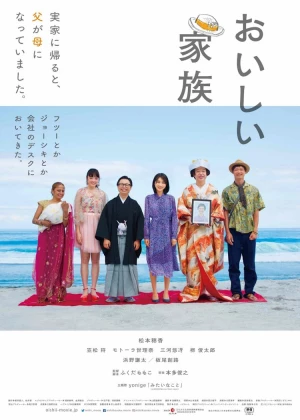My Father, the Bride

While Japanese cinema is pretty broad and varied, spanning films from the most minimalist corners to the craziest maximalist outreaches of the medium, it was never really the favored outlet to push social progress. But times are changing and such stories are getting more exposure. Momoko Fukuda's My Father, the Bride [Oishii Kazoku] Is a film that falls into this category, though it's a little different from what you'd normally get from these types of films. It's a sweet and well-intentioned feature, but if you get easily triggered or are very opinionated on how these subjects should be portrayed, think twice before watching this film.
![screencap of My Father, the Bride [Oishii Kazoku]](/thumbs/img/articles/1200xauto/my-father-bride-1.webp)
Naoko Ogigami's Close Knit is probably a turning point for Japanese LGBTQ+ cinema, as that film got quite a few accolades, including some prestigious prizes. It is a very traditional drama though. Yes, the main character is trans, but other than that, it's one of Ogigami's tamest and least recognizable films, as if she tried to strip anything that could detract from the core theme. It's a pretty traditional approach and one of the reasons why I'm generally not too drawn by queer cinema. I'm not watching narrative cinema for its factual takeaways, I'm watching it for its mood and world-building.
Enter My Father, the Bride which is quite the opposite of that. Momoko Fukuda serves a rather dry, quirky comedy where the queer elements are joyfully exaggerated. Don't be mistaken though, the point of the film isn't to make fun of these people or their feelings, on the contrary. What it does is that it puts the audience in the shoes of the main character (a rather traditional woman who is not used to being exposed to the wonders of queer identity) and uses this exaggerated reality to make the point that whatever we consider weird or unnatural is just something we have to overcome ourselves.
Toka is a young woman working as a stylist in Tokyo. When her relationship there comes to a standstill, she decides to return home to visit her family and join the anniversary of her mother's death. Things on the island have changed though. When she meets her father, he is wearing her mother's old clothes, and he introduces her to a local fisherman and his daughter, who are now living with him. They plan to marry and form a new family. Toka is taken aback by all these changes and doesn't understand that her brother seems fine with it. But he is too occupied taking care of his Sri Lankan, pregnant wife.
![screencap of My Father, the Bride [Oishii Kazoku]](/thumbs/img/articles/1200xauto/my-father-bride-2.webp)
Visually, there's a lot to enjoy here. After spending a short time in Tokyo, we quickly swap locations to one of Japan's many idyllic islands, which Fukuda eagerly makes use of. The setting is gorgeous, and the stark framing, lush coloring, and warm lighting all help to give the film a very cozy, summery feel. I think Fukuda still could've done a little more to enhance the mood, the style itself is pretty familiar and by the numbers, but for a comedy, it looks way better and a lot more polished than it needs to be. And it makes me excited to try out some of her more recent films.
The soundtrack is a little peculiar, but it has an important function to fulfill and it does that remarkably well. The music is quite quirky and jolly, as to underline the comedy aspect of the film. While a more typical drama soundtrack could've worked well here (stylistically at least), I think the message would've been a bit harder to decipher. The film is wilfully silly and unwilling to sugarcoat the comedy, and to make sure people don't take that the wrong way, the score is a real giveaway that no harm was intended. Whether that's enough is another matter, but at least the film made its intentions very clear.
The performances are strong and hit the right notes. Honoka Matsumoto is perfect as Toka, playing a somewhat stuck-up woman who slowly warms up to her new environment and sees the error of her ways. But it's Itsuji Itao who has the best part here. He's a rather stern and manly actor (not testosterone/macho manly, but salaryman manly) and simply seeing him in women's clothes fries your brain. Serena Motola and Shuntarô Yanagi leave strong impressions too (though in part thanks to their styling), prompting me to give kudos to whoever was in charge of casting. They did an excellent job.
![screencap of My Father, the Bride [Oishii Kazoku]](/thumbs/img/articles/1200xauto/my-father-bride-3.webp)
Where this film differs from the usual queer cinema is that it doesn't mind making fun of its queer elements. But there is no malice here, and the bottom line of the film is that people shouldn't prevent others from being happy just because they can't wrap their brains around certain decisions or actions of others. And that is aptly illustrated in the final third of the film, while still maintaining a pleasant mix of comedy and drama. No doubt some will find it tasteless and not done, which is fine too, but I'd urge anyone to make up their mind, rather than throw some fit without seeing the actual film.
My Father, the Bride is a bright and endearing Japanese comedy, mixing island appeal with dry, quirky comedy and queer themes, but doing it in such a way that it feels fresh and exciting. It's not an easy film to get a hold of and I'm not sure how it would fare if it were to be exposed to a broader audience (especially people who don't have a feel for contemporary Japanese cinema/culture), but if you're not easily triggered and you don't mind a silly comedy which has its heart in the right place, than this is an easy recommendation. I certainly wouldn't mind watching similar films.